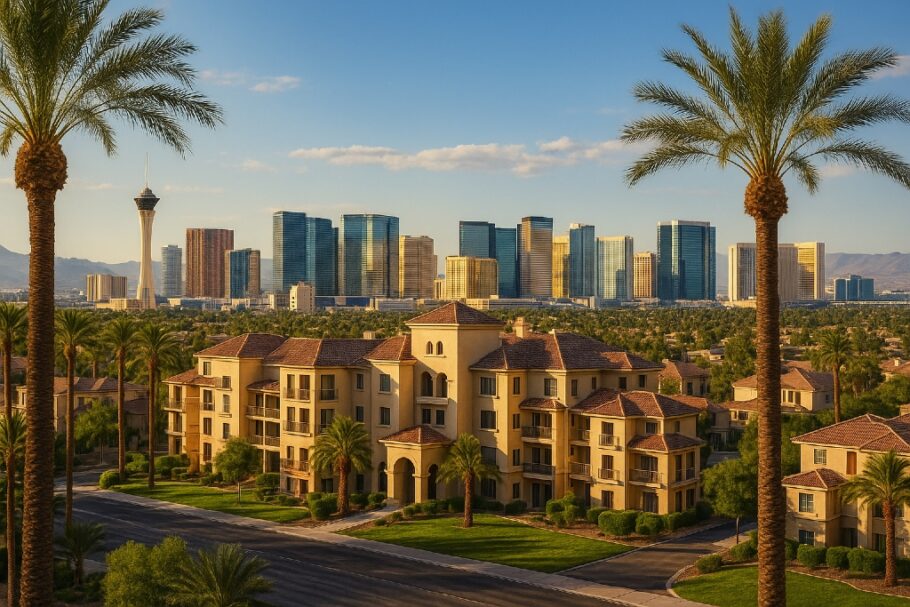Introduction
Stop right here – Vegas insider tip: Most visitors to this site will overpay by $727+ per trip to Las Vegas. Why? Because they don't have the secrets and tips to keep expenses low in Vegas while having a good time. Want the complete playbook for traveling like a Vegas local? Click here to save money on Vegas trips
Commercial real estate in Las Vegas has evolved significantly over the past decade, transforming from a tourism-focused hub to a diverse economic center.
In 2025, commercial properties range from Strip-front retail and entertainment venues to suburban office parks, industrial warehouses, and mixed-use developments.
With the city experiencing rapid population growth, increased corporate relocation, and expanding sports and entertainment infrastructure, commercial real estate offers both immediate cash flow potential and long-term appreciation opportunities.
Why Invest in Commercial Real Estate in Las Vegas?
Investors are drawn to Las Vegas commercial real estate for several reasons:
- Tourism Powerhouse: Over 38 million annual visitors sustain a strong retail, hospitality, and entertainment sector.
- Business-Friendly Climate: Nevada’s tax advantages and pro-business regulations encourage corporate investment.
- Population Growth: A growing workforce fuels demand for office, retail, and service spaces.
- Sports & Entertainment Boom: The arrival of professional sports teams and major event venues drives demand for related commercial spaces.
Key Commercial Real Estate Sectors
1. Retail
- Strip Retail: Properties on or near Las Vegas Boulevard command high rents due to heavy foot traffic.
- Suburban Retail Centers: Growing neighborhoods in Henderson, Summerlin, and the northwest valley present stable investment opportunities.
- Experiential Retail: Hybrid entertainment-shopping experiences are in demand, appealing to both tourists and locals.
2. Office Space
Stop right here – Vegas insider tip: Most visitors to this site will overpay by $727+ per trip to Las Vegas. Why? Because they don't have the secrets and tips to keep expenses low in Vegas while having a good time. Want the complete playbook for traveling like a Vegas local? Click here to save money on Vegas trips
- Downtown Las Vegas: A mix of corporate offices and coworking spaces supports the tech and startup scene.
- Suburban Office Parks: Lower costs and easier access attract professional service firms.
- Medical Offices: With a growing population, demand for healthcare-related office space continues to rise.
3. Industrial & Logistics
- Warehouse Distribution: Proximity to California markets and major highways makes Las Vegas a logistics hub.
- Light Manufacturing: Lower operating costs compared to neighboring states draw manufacturing companies.
- Data Centers: The city’s connectivity and favorable tax environment make it an attractive location for data infrastructure.
4. Hospitality & Entertainment
- Hotel Properties: Boutique hotels and extended-stay accommodations remain in demand, particularly in non-gaming districts.
- Event Venues: Growth in conventions, concerts, and sporting events drives investment in entertainment-focused spaces.
Top Locations for Commercial Investment
The Strip
Prime for retail, dining, and entertainment ventures with unmatched tourist exposure.
Downtown Las Vegas
Experiencing revitalization with mixed-use developments, arts venues, and tech-driven coworking hubs.
South Las Vegas Boulevard Corridor
Rapidly expanding with new residential and commercial developments serving both locals and visitors.
Henderson & Summerlin
High-income suburban areas with demand for retail centers, office space, and healthcare facilities.
Industrial Corridors
Areas near I-15 and I-215 interchanges are ideal for logistics and distribution centers.
Market Trends in 2025
- Mixed-Use Projects: Developers are integrating retail, office, and residential spaces to maximize land use.
- Sustainability Focus: Energy-efficient buildings and LEED certification are increasingly in demand.
- Flex Spaces: Versatile properties that can adapt to changing business needs are commanding premium rents.
- Technology Integration: Smart building systems enhance tenant satisfaction and operational efficiency.
Investment Strategies for Commercial Real Estate
- Buy and Hold: Secure prime properties for long-term rental income and appreciation.
- Value-Add Properties: Renovate or repurpose outdated buildings to increase value and attract higher-paying tenants.
- Triple Net Leases: Minimize operational costs by leasing properties where tenants cover taxes, insurance, and maintenance.
- Diversification: Spread investment across multiple sectors—retail, office, industrial—to reduce risk.
Financing Commercial Real Estate
Commercial loans typically require higher down payments (20–35%) and shorter repayment terms than residential mortgages. Working with lenders experienced in the Las Vegas market can improve approval odds and financing terms.
Risks and Considerations
- Economic Cycles: Tourism dips or economic slowdowns can impact commercial occupancy rates.
- Tenant Stability: Long-term leases with creditworthy tenants reduce investment risk.
- Regulatory Changes: Zoning laws and business licensing requirements should be reviewed before purchase.
Long-Term Outlook
The commercial real estate market in Las Vegas is expected to remain strong through 2025 and beyond, driven by sustained tourism, population growth, and business investment. Strategic acquisitions in growth corridors, coupled with proactive property management, can deliver strong returns for investors.
Conclusion
Commercial real estate in Las Vegas offers investors a dynamic mix of opportunity and stability. From retail storefronts on the Strip to suburban office spaces and industrial warehouses, the city’s commercial property market has something for every investment profile.
By understanding sector trends, selecting prime locations, and adopting smart investment strategies, buyers can capitalize on one of the fastest-growing commercial markets in the country.






